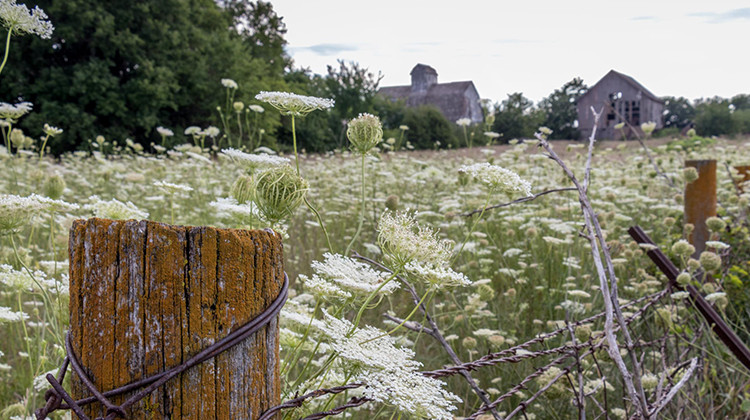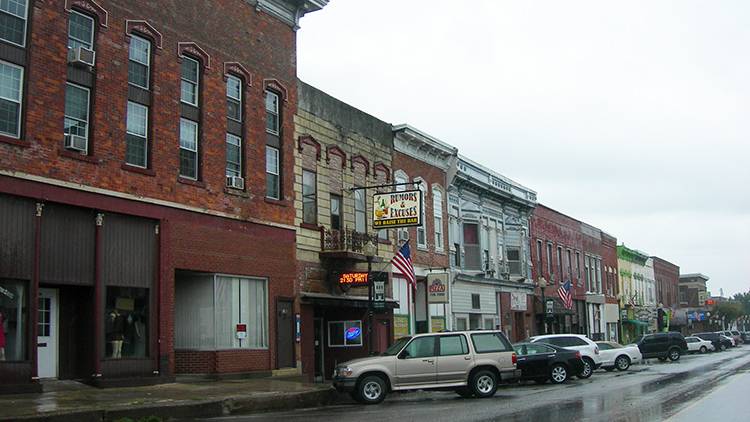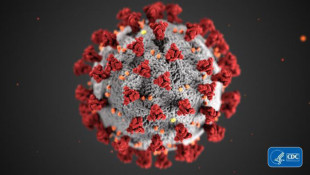
Many rural areas are vunerable to COVID-19 outbreaks because of older populations and limited hospital space.
Michael Leland/Side Effects Public MediaMany of America’s rural counties have just a handful of COVID-19 cases. And health experts say that may be giving residents a false sense of security. Now, outbreaks at food processing plants could shake that complacency.
Louisa County in southeastern Iowa, along the Mississippi River, has just over 11,000 residents, including many who work in agriculture.
It also has a large number of COVID-19 cases — more than 200. Most are linked to a meat processing plant.
"We were a little surprised that it took off as quickly as it did," says Mayor Shawn Mayne of Wapello, the county seat. It’s about 14 miles from the Tyson pork plant.
Mayne says his town of about 2,000 does have some COVID-19 cases, but he’s not worried. He says residents are following precautions like social distancing.
"Louisa County is so rural, there is not one streetlight in the entire county. So we're already kind of spread out a little bit," he says.
Louisa is not the only rural county dealing with a COVID-19 outbreak at a meat processing plant. Missouri, Indiana, South Dakota, Wisconsin — and at least two other Iowa communities — have had outbreaks affecting hundreds of people.
Megan Srinivas, an infectious disease specialist in Fort Dodge, says rural areas are much more vulnerable to COVID-19 than many realize. One reason: Residents are more likely to have multiple chronic conditions, or comorbidities.
"We are a much older population, we're a population that has a lot more comorbidities, and both of those things places as at high risk for having severely ill patients," Srinivas says.

Columbus Junction in rural Louisa County, Iowa, has been hard hit with COVID-19 cases because of an outbreak at a Tyson meat packing plant. (Jimmy Emerson, DVM/Flickr - CC-BY-NC-ND-2.0)
A University of Texas at Austin study released this month predicted if there’s just one confirmed COVID-19 case in a rural county, the chances of an undetected outbreak increases from 9 percent to 51 percent.
Many rural hospitals also have few ICU beds, and testing is limited so it’s unclear how many cases are out there, she adds. "People have this false sense of security. That's only going to enable the virus to be able to penetrate our populations more."
It’s not hard to find that feeling in rural communities.
In Appanoose County on the Missouri border, there have been two confirmed cases of COVID-19. Both people died.
But lifelong resident Terry Tuttle, who owns a local restaurant, sees a silver lining. "The thing I'm very thankful for, as well as my family is, that we live in southern Iowa as compared to living in Des Moines or even have a larger city."
Robin Harmon also feels safer in a smaller community. She lives in the northeastern corner of the state, in Allamakee County, which has more than 40 confirmed cases.
"I guess I don't think about it because I just think about coming to work," Harmon says. "But for people that have underlying health issues, they're nervous about it, because you know, they don't want to catch it."
Harmon is more worried about her restaurant, which has lost two-thirds of its business. She says most of Allamakee’s cases are in a town on the other side of the county.
Still, some rural residents worry about visitors bringing the virus to their area.
In Dickinson County in northwest Iowa, Emergency Management Coordinator Mike Ehret said a lot of people are coming from cities like Des Moines or Omaha to their vacation homes.
Ehret says they’ve asked anyone coming from outside the county to self-isolate for 14 days. "We don't want a bunch of people out here in our county to end up with COVID because somebody came in for the summer and somewhere else and then brought it with them."
Out-of-state visitors also helped highlight a potential trouble spot. Earlier this month, Wayne County in southern Iowa got a lot of attention when a local man hosted a horse auction that drew 600 people from eight states.
County Health Administrator Shelly Bickel said her department strongly opposed it. "The problem was it came down to one man who we went out and talked to him. Everybody talked to him. He didn't listen."
Right after that auction, Iowa Gov. Kim Reynolds imposed restrictions that would stop similar events from happening. Iowa is one of the few remaining states that has not issued a shelter-in-place order.
This story was produced by Side Effects Public Media, a news collaborative covering public health.
 DONATE
DONATE





 View More Articles
View More Articles



 Support WFYI. We can't do it without you.
Support WFYI. We can't do it without you.